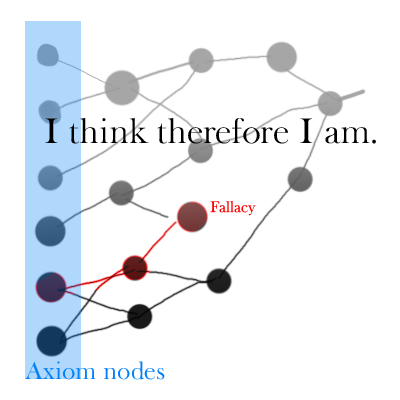This is a project based on the idea of being able to collaborate with my professors on logical arguments. Very often I find myself constructing huge lines of reasonings in my head. I try to be a logical guy. Unfortunately, it is very hard to validate ambitious arguments with grand conclusions when they are crafted in an essay format. Any logical flaw caught in any part of a logical chain is basis for not appreciating the end conclusion.
Just because an argument is false, doesn't mean the conclusion is false. Dismissing the conclusion is not necessarily correct. But at the very least, the rigorous analysis of a logical chain guarantees, that any proposition made within the chain is not incorrect (with regard to a formal system).
If this is possible, then perhaps direct democracy can exist: a democracy (not a republic) where every person can have a voice in political argument. Historically, this has been logistically impossible because it is hard to have a coherent, rigorously analyzed discussion among several millions of people at once. This allows politicians to exploit rhetoric and utilize logical fallacies such as ad hominem and converse logic against the public. I think direct democracy may have its roots in the internet.
A single coherent logical graph can be used to explore all political ideas. People can analyze individual propositions in the logical graph and comment about its "truthiness".

Is it possible for the entire universe of human knowledge to be parsed into a gigantic graph of propositions and entailments?
I have recently found out that software for analyzing arguments already existed: Interactive Theorem Proving. However, current implementations are not currently designed for such large scale intents.
Further motivation for this project is the question:
Is it possible for a machine learning algorithm to use this "graph of truth" to
guess logical connections between premises and conclusions? People might be able to use machines to
do their thinking for them...
In a formal argument, there are premises and conclusions.
If the premises are true, then the argument may entail a true conclusion depending on whether
it uses a proper rule of inference.
Thus, an argument can be thought of as a directed acyclic graph where the nodes are propositions
that are true, and the edges are entailments.
A user should be able to comment on the truth of any proposition or inspect entailments and the derived conclusions. A voting system may be used to keep the logical graph in a state of integrity.
In short: This is an incompleted Django app that I worked for based on some weird idea of having a logical graph.